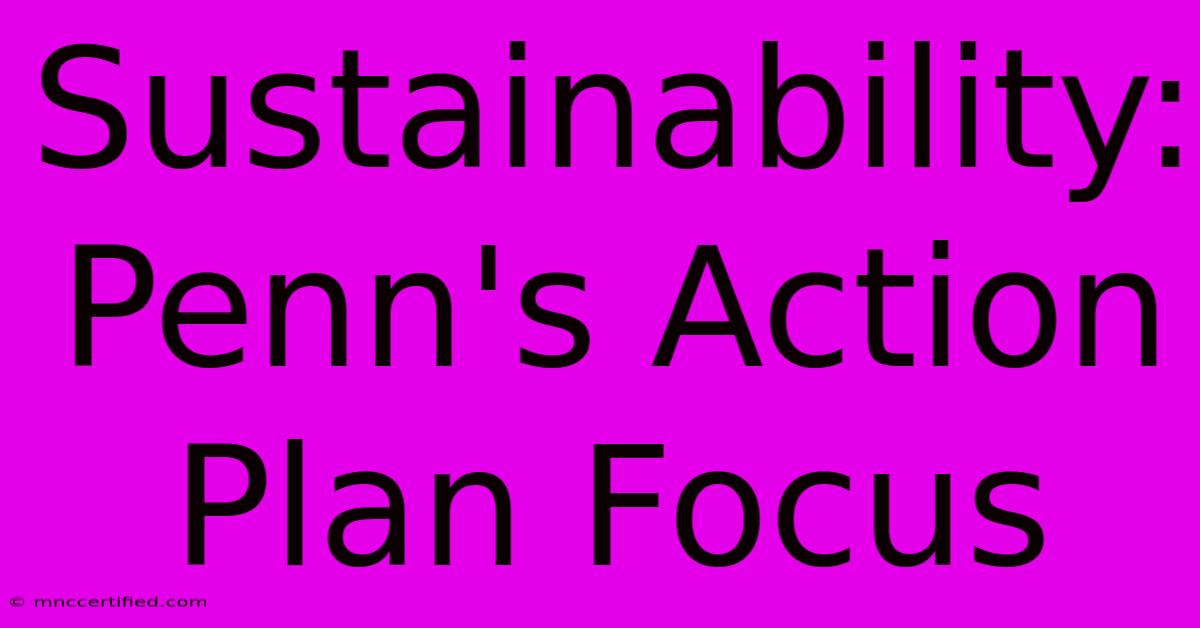Sustainability: Penn's Action Plan Focus

Table of Contents
Sustainability: Penn's Action Plan Focus
The University of Pennsylvania has committed itself to a comprehensive sustainability plan, outlining ambitious goals and concrete actions across its operations. This commitment reflects a growing awareness of the urgent need for environmental responsibility within higher education and a broader societal shift towards sustainable practices. This article delves into the key focus areas of Penn's sustainability action plan, highlighting its progress and future aspirations.
Penn's Sustainability Goals: A Multifaceted Approach
Penn's sustainability action plan isn't a single initiative but a multifaceted approach encompassing various interconnected areas. The university aims to achieve significant reductions in its environmental footprint across several key sectors. This includes:
1. Carbon Neutrality: A Central Goal
Achieving carbon neutrality is a central pillar of Penn's sustainability plan. This ambitious goal requires a substantial reduction in greenhouse gas emissions through various strategies, including:
- Renewable Energy Sources: Investing in and transitioning to renewable energy sources like solar and wind power to reduce reliance on fossil fuels. Penn is actively exploring opportunities to expand its on-campus renewable energy generation.
- Energy Efficiency Upgrades: Implementing energy-efficient technologies and practices across campus buildings to minimize energy consumption. This includes upgrades to heating, cooling, and lighting systems.
- Sustainable Transportation: Promoting sustainable transportation options for students, faculty, and staff, such as cycling, walking, and public transport. This also involves reducing reliance on personal vehicles through initiatives like bike-sharing programs and improved public transit access.
- Carbon Offsetting: Exploring carbon offsetting programs to compensate for unavoidable emissions. This strategy involves investing in projects that remove or reduce greenhouse gas emissions elsewhere.
2. Waste Reduction and Recycling: Minimizing Environmental Impact
Penn is committed to minimizing waste and maximizing recycling rates. This involves:
- Comprehensive Recycling Programs: Expanding and improving existing recycling programs across campus to divert waste from landfills. This includes clear labeling and education initiatives to promote proper recycling practices.
- Waste Diversion Initiatives: Implementing strategies to reduce waste generation at the source, such as promoting reusable containers and reducing single-use plastics. Composting programs are also crucial in this effort.
- Sustainable Procurement: Prioritizing the purchase of sustainable and recycled products to reduce the environmental impact of procurement practices. This includes specifying recycled content in purchasing decisions.
3. Sustainable Food Systems: Promoting Local and Ethical Sourcing
Penn's commitment to sustainability extends to its food systems. The university is focused on:
- Sourcing Local and Sustainable Food: Increasing the sourcing of locally produced and sustainably grown food for dining halls and campus events. This supports local farmers and reduces the carbon footprint associated with food transportation.
- Reducing Food Waste: Implementing strategies to minimize food waste in dining halls and across campus. This includes improved food management practices and educational campaigns promoting mindful consumption.
- Promoting Plant-Based Options: Encouraging the consumption of plant-based meals to reduce the environmental impact of meat production.
Measuring Progress and Accountability
Penn regularly reports on its progress towards its sustainability goals, providing transparency and accountability. This includes publishing annual sustainability reports that detail achievements, challenges, and future plans. These reports are crucial for tracking progress and informing future strategies.
Engaging the Penn Community: Collaboration is Key
Penn's sustainability efforts rely heavily on the engagement and participation of its entire community—students, faculty, staff, and alumni. The university fosters a culture of sustainability through various initiatives, including:
- Educational Programs: Offering various educational programs and workshops on sustainability topics to raise awareness and promote engagement.
- Student-Led Initiatives: Supporting and encouraging student-led sustainability initiatives and clubs.
- Community Partnerships: Collaborating with local organizations and communities on sustainability projects.
Conclusion: A Commitment to a Sustainable Future
The University of Pennsylvania's sustainability action plan represents a significant commitment to environmental responsibility and a sustainable future. While achieving these ambitious goals requires ongoing effort and collaboration, Penn's dedication to transparency, accountability, and community engagement positions it as a leader in higher education sustainability. By continuing to implement innovative strategies and engaging its community, Penn can serve as a model for other institutions striving to create a more sustainable world.
Keywords: University of Pennsylvania, Penn, sustainability, sustainability plan, carbon neutrality, renewable energy, energy efficiency, waste reduction, recycling, sustainable food systems, local sourcing, environmental responsibility, higher education sustainability, green initiatives, sustainability report, climate action.

Thank you for visiting our website wich cover about Sustainability: Penn's Action Plan Focus. We hope the information provided has been useful to you. Feel free to contact us if you have any questions or need further assistance. See you next time and dont miss to bookmark.
Featured Posts
-
Jaguars Redesigned Logo Draws Ire
Nov 21, 2024
-
Penn Dot Crews Ready For Winter
Nov 21, 2024
-
Chabert Insurance Of Baton Rouge
Nov 21, 2024
-
Fintechzoom Best Crypto Exchange
Nov 21, 2024
-
Johnson Lambert Honor Strait 2024
Nov 21, 2024